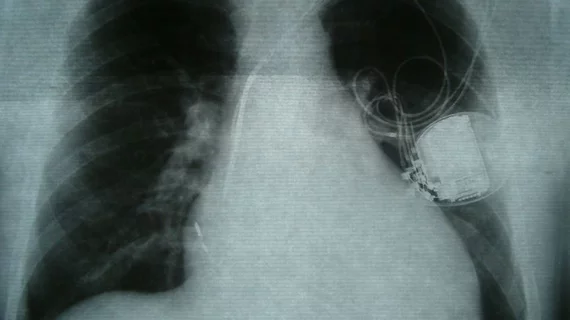Cardiac implantable electronic devices can be safely reprogrammed to MRI-safe mode via remote operator
New technology is opening diagnostic doors for a large population of patients who were previously deemed ineligible for MRI scans due to the presence of cardiac implantable electronic devices (CIED), such as pacemakers.
These patients have long been told to avoid most MRI exams due to uncertainty in how their implanted devices would react to such a strong magnetic field. When MRI is the best option for patients with CIEDs, a trained operator must accompany the patient to program the device, which can create scheduling conflicts. But a new study published in the Journal of Cardiovascular Electrophysiology highlights a potential solution to the imaging conundrum—remote reprogramming of implanted devices to an MRI-safe mode.
Researchers at the University of Missouri School of Medicine included 209 patients in their observational study. Before completing an MRI exam, each patient underwent remote programming of their implanted device using Medtronic RM CareLink technology. Before the exam, an MRI tech placed a programming wand from the 2090 Medtronic programmer over the patient’s device and then contacted an off-site operator, who was able to access the device remotely and switch it to MRI-safe mode for the scan. Upon scan completion, the remote operator then changed the device back to the patient’s baseline settings if necessary.
The remote reprogramming, according to the authors, resulted in a successful, event-free scan for every patient.
“During this study, none of the patients experienced any symptoms during the scan, no one needed any changes to the baseline settings afterward, and there were no technology issues,” Sandeep Gautam, MD, of the Division of Cardiovascular Medicine at the University of Missouri Columbia, and co-authors explained. “The estimated time saved per scan was 18 to 38 minutes per patient, calculated by measuring the device representative's travel time to the MRI suite.”
Current practice of scanning patients with MRI-conditional cardiovascular implantable electronic devices involves the on-site presence of a trained professional to program the device. This is time-consuming and increases costs, and in the event of an emergency might not be feasible at all.
“We believe this technology will reduce unnecessary use of health care resources and manpower,” the authors said. “This will eventually lead to reduction in health care costs, as it will require a smaller number of personnel for device programming, eliminate travel costs and may be especially helpful in rural areas where access to health care is limited.”
The authors did conclude that larger studies using various vendors are needed to validate the efficacy of remote device reprogramming before it can be implemented on a wide scale.
The study, "Remote programming of cardiac implantable electronic devices: A novel approach to program cardiac devices for magnetic resonance imaging," can be viewed in the Journal of Cardiovascular Electrophysiology.
Related MRI content:
Study links MRI findings with mental health disorders
New mobile low-field MRI scanner inches closer to increasing imaging access in rural communities
Researchers use MRI scans to develop a growth chart specific to the human brain
Augmented reality bear helps calm pediatric patients undergoing MRI exams

